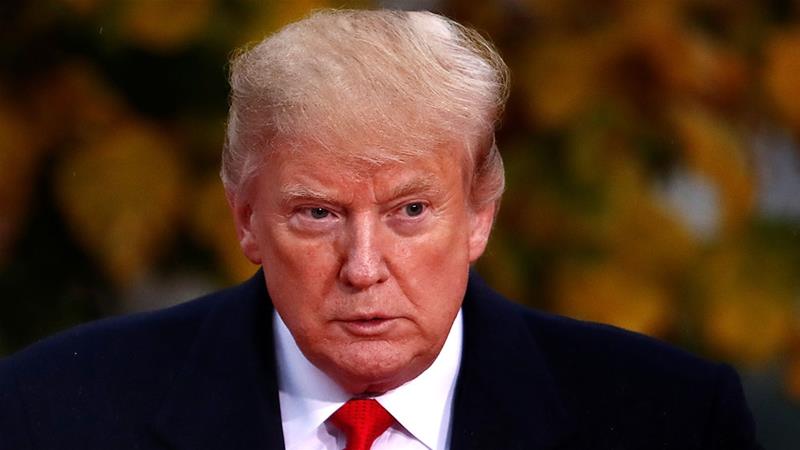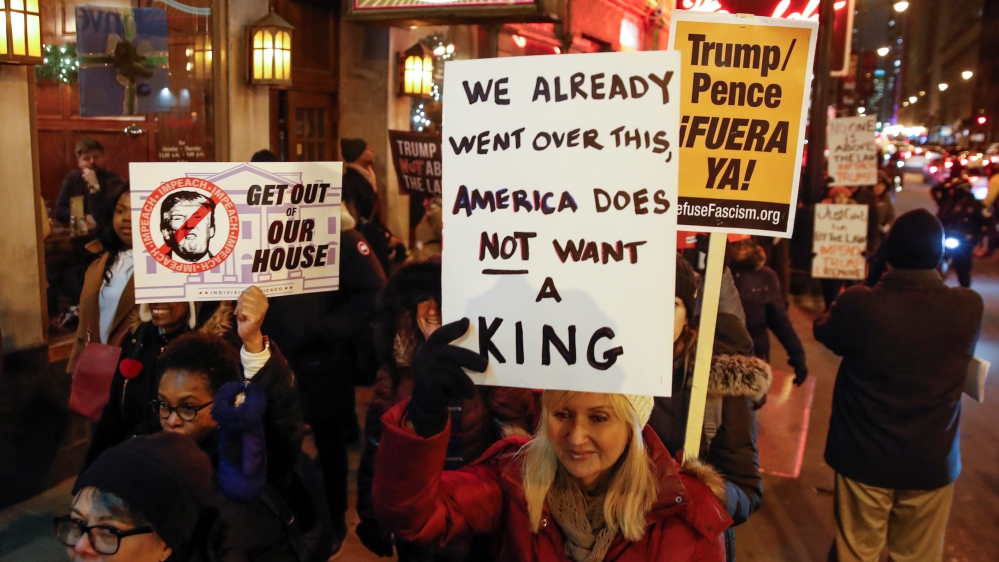Trump is the 3rd president in US history to be impeached. Votes set up likely January trial in Republican-led Senate.
to impeach President Donald Trump for obstruction of Congress and abuse of power related to his dealings with Ukraine.
Trump is only the third president in US history to be impeached by the full House. Wednesday’s votes set up a likely January trial in the Republican-controlled Senate.
“It is tragic that the president’s reckless actions, make impeachment necessary,” House Speaker Nancy Pelosi said as she “solemnly and sadly” opened the House debate on impeachment.
“He gave us no choice,” Pelosi said.
“The president is an ongoing threat to our national security, and the integrity of our elections, the basis of our democracy,”
Trump, who has denied any wrongdoing, took the stage at a Michigan rally as the House began voting on impeachment.
“Tonight the House Democrats are trying to nullify the ballots of tens of millions of patriotic Americans,” Trump told the crowd.
The vote on abuse of power was 216-197. Two Democrats voted against the first article, and one voted present.
The vote on obstruction of Congress was 229-198, with three Democrats voting against the second article and one voting present.
At the centre of the Democrats impeachment of Trump was a July 25 telephone call the president had with newly elected Ukraine President Volodymyr Zelenskyy.
Trump urged Zelenskyy in the call to investigate former Vice President Joe Biden, and his son, Hunter, who was had served on the board of a Ukrainian gas company.
Joe Biden is a leading contender in the race for the Democratic nomination for president in 2020. There has been no evidence of any wrongdoing by the Bidens.
Democrats allege Trump abused the power of the US presidency by organising a scheme to extort a promise from Zelenskyy. At the time of the call, Trump was withholding $391m in military aid to help Ukraine defend against Russia.
Trump further conditioned a White House meeting for Zelenskyy on Ukraine announcing an investigation on a debunked conspiracy theory that Ukraine, not Russia, interfered in the 2016 US elections, according to witness testimony.
Trump and his Republican political allies have called the House’s impeachment inquiry a “sham” and a “witch-hunt”.
On Tuesday, the president sent a blistering letter to House Democratic leaders, accusing them of an attempted coup and declaring “war on American democracy”.
“This is not a solemn occasion,” said Representative Doug Collins, the ranking member of the House Judiciary Committee.
“You’ve been wanting to do this ever since the gentlemen was elected,” he added, referring to Trump.
The inquiry began after an anonymous intelligence agency whistle-blower issued an internal report in August calling into question Trump’s handling of Ukraine policy.
The House Intelligence Committee, together with the Oversight and Foreign Affairs committees, interviewed 17 witnesses and held five days of public hearings before producing a 300-page report showing Trump and key administration officials pressured Zelenskyy.
“We have found incontrovertible evidence that President Trump abused his power by pressuring the newly elected president of Ukraine to announce an investigation into President Trump’s political rival,” said Representative Adam Schiff, who as chairman of the Intelligence Committee led the House impeachment inquiry.
The White House blocked nine officials from testifying in the House inquiry and instructed agencies to withhold documents, acts that formed the basis for the article of impeachment for obstruction of Congress.
By categorically defying congressional requests for testimony and documents, “the President took extreme and unprecedented steps to obstruct our investigation into his conduct,” said Representative Jerrold Nadler, chairman of the House Judiciary Committee.
Duelling narratives
In the lead up to the impeachment votes, Americans remained sharply divided over the issues.
A rolling calculation of support for impeachment by the website FiveThirtyEight.org suggested that 47.4 percent support Trump’s impeachment and removal from office, while 46.6 percent did not support impeachment.
But the polls also suggested Americans are starkly divided along partisan lines.
According to RealClearPolitics.com’s national average of polls, 83 percent of Democrats support impeachment, while 88 percent of Republicans do not.
The political division in the US over the impeachment of Trump appears to be based on duelling versions of the truth between the two parties.
Democrats say the facts and evidence established without doubt that Trump pressured Ukraine to investigate a political rival. Republicans deny there was any “quid pro quo” (Latin for “this for that”) and point out US military aid was delivered, a bilateral meeting was held with Zelenskyy, who said he never felt pressured.
“There are for the first time in our history, really two universes in collision and the constitution doesn’t exactly anticipate the existence of two realities, one of which is based on what actually happened, and the other which is quite fantastic and imaginary,” said Laurence Tribe, a professor of constitutional law at Harvard Law School.
“But when there is that kind of collision, there exists no authority to resolve the ultimate issue of truth,” Tribe told Al Jazeera. “We are in quite uncharted territory.”
Wednesday’s six-hour debate showcased those narratives. Democrats focused on the actions of Trump that led to the impeachment investigation and his refusal to participate in the inquiry, as well as what they said was their oath to the constitution.
“In 2019, President Trump sought foreign interference when he needed a favour from Ukraine,” said Democrat Steve Cohen.
“President Trump attacked in his continuing threat to our system of free and fair elections. I took an oath. I urge my colleagues to abide by that oath and stand up to President Trump’s abuse of power and obstruction of Congress,” Cohen added.
Republicans, meanwhile, focused on attacking the impeachment inquiry process itself, saying Trump was blocked from having due process.
“This impeachment is based purely on partisan motives,” Republican Ross Spano on the House floor.
Senate trial likely in January
Under the US Constitution, the House vote on Wednesday sets up a likely January trial in the Republican-controlled Senate.
A 67-vote supermajority would be required to find the president “guilty” and remove him from office, an outcome seen as unlikely. The Senate is made up of 53 Republicans, 45 Democrats and two independents who caucus with the Democrats. At least 20 Republicans would have to vote with all Democrats and the two independents to remove the president.
Senate Republican Leader Mitch McConnell told reporters on Tuesday he is coordinating strategy for the trial with the White House to obtain an acquittal of the president. He
Democratic Leader Chuck Schumer accused McConnell on Tuesday of participating “in a cover-up” and said he plans to force votes in the Senate to call witnesses in support of the articles of impeachment.
Only two presidents – Andrew Johnson in 1868 and Bill Clinton in 1998 – have been impeached. Both were acquitted in a Senate trial.
Trump’s impeachment comes less than two months out from the start of the primary election season.
National elections for president, all 435 members of the House and 35 of 100 senators will be held November 3, 2020.
SOURCE: Al Jazeera News


![House Speaker Nancy Pelosi is seen on a jumbotron outside ABC News studios speaking to the US House of Representatives during the session to discuss rules ahead of a vote on two articles of impeachment against US President Donald Trump, at Times Square in New York City [Shannon Stapleton/Reuters] Nancy Pelosi](https://www.aljazeera.com/mritems/Images/2019/12/18/d484bbe95a7a42f1af3aac79838958ca_18.jpg)
![Pelosi wields the gavel as the House of Representatives votes on the first of two articles of impeachment against Trump [House TV/Reuters] Impeachment vote](https://www.aljazeera.com/mritems/Images/2019/12/19/0326049eb6d24e4f95f00972b4a7879b_18.jpg)
![House Judiciary Committee ranking member Doug Collins speaks as the House of Representatives debates the articles of impeachment against President Donald Trump [House Television/AP Photo] Doug Collins](https://www.aljazeera.com/mritems/Images/2019/12/18/5d078086373c4b99b2bf662b5cdbae96_18.jpg)

![A supporter of President Donald Trump holds a banner outside the US Capitol building [Julio Cortez/AP Photo] Trump supporters impeachment](https://www.aljazeera.com/mritems/Images/2019/12/18/6672eae903db43a3b7c52fb8f957fdd8_18.jpg)